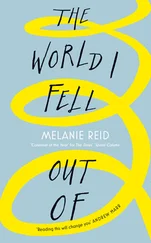1 ...7 8 9 11 12 13 ...17 Around then the doctors finally took me off tramadol and I experienced my first proper sleep, morphine-free. I remember waking with a sense of profound joy, awash with the novelty of feeling deeply rested. Unbelievably restored, at peace. All traces of the orange cable-stitch wool had gone away and the sunlight was streaming through the thin patterned curtains around my bed, a pattern of blue oblongs and squares which I had, it seemed, been studying and reinterpreting for years. For the first time the material looked fresh, normal – just cloth – not an omen, or pictures, or a metaphor, or a maze.
It was time to move into the unknown.
CHAPTER THREE
Swallow Diving from the Seventh Floor
What hath night to do with sleep?
John Milton, Paradise Lost
The rehab ward was no place for sissies. I learnt that in the middle of my first night, woken from sleep as if for a hostile interrogation. Two nursing assistants arrived in my bedspace with a flourish, switching on the full-strength fluorescent examination light overhead, pulling the curtains noisily shut behind them, stripping back my blankets. It was somewhere in the small hours; there were other patients asleep a few feet away in the same room.
‘What’s happening?’
No reply. They were talking, but not to me.
I was bewildered, dazzled, disorientated. They were putting their hands under me, moving me across the bed. Maybe this was another fantasy kidnap.
‘Please, what’s happening?’
One of them broke off from their conversation.
‘You need turned.’
He reeked of cannabis. Dougie always said I had a nose like a bloodhound but this guy was in a different league. You could almost taste it. Together they worked like a Formula One pitstop team: rolled me onto my other hip, wedged a pillow behind my back to keep me there, placed another pillow under my top knee, and switched my overnight urine drainage stand, attached to my catheter, to the opposite side of the bed. It was done in seconds, a slick, well-practised manoeuvre. Wham bam, wheelnuts tight, off you go, Sebastian Vettel, back out of the pit lane.
‘OK,’ Doobie said. It wasn’t a question. They switched off the blinding light, pulled back the curtains, and moved to the next bed. Click, swoosh, gone. Not remotely cruel, but not remotely kind either. Disengaged, impersonal. I wasn’t a person; I was a task, one of dozens of four-hourly turns they had to perform through the night. It was an attitude I was to become deeply accustomed, and eventually immune to. But right at that moment, I had never felt more alone, more insulted by the stench of cannabis, or more acutely aware of what a sheltered, precious, middle-class prat I was to feel so offended. Later, when I got to know Doobie better, I became quite fond of him. But not his smell.
Way back in the beginning, hospital was a sanctuary. Like driftwood washed to the top of the beach by a high tide, salt-bleached, splintered by the storms, you just rest awhile, nestling in the sand. Something terrible has befallen you, but if you lie very, very still, you will be safe. Nothing is asked of you. Hands which you cannot feel will gently position you; quiet voices address you. In intensive-care and high-dependency wards, they turn you frequently in the night to protect your skin from pressure sores, but they do it discreetly and by torchlight in order not to wake you. When you cease to be acutely ill, and move away from those remarkable acute areas where the staff ratio is generous and the NHS functions at its very best, things change. The nurses in high-dependency tried to warn me about the difference in ethos awaiting me. ‘It’s different next door,’ they said. Next door was the adjoining corridor, the forty-bed spinal rehabilitation ward, where, having had your spine stabilised, you would be schooled to cope with your condition. Weeks later, Euphorbia, one of the senior rehab nurses, proudly shared with me the standard joke about the transition.
‘Like going from the Ritz to a Travelodge,’ she said. And laughed. Took me a while to find it funny, but I did eventually.
The ward seemed more Guantanamo than Travelodge, though, that first night after the interruption, as I lay with a thumping heart and retinas imprinted with the white-hot square of the ceiling light. It struck me, as I struggled to take in the rules and understand the rhythm of the ward, that this was what being dumped at boarding school must have felt like to a sheltered child. A doctrine of tough love with the love taken out. Newly paralysed, I was exquisitely powerless to do anything but watch and listen. Once again, I garrisoned myself deeper and deeper in that only safe place, my head. Once again, it came down to survival.
And boy, imprisoned, motionless, I really did feel my spaceship had landed me on yet another alien planet. I had to learn fast. There was something almost Darwinian about it. Sink or swim. Adapt or die. A rehab ward in a spinal unit is like an under-strength factory floor: too few staff battling to a relentless timetable of feeding, medicating, washing, toileting, dressing and hoisting dozens of helpless carcasses into wheelchairs to get them to the gym. I guess it’s a bit like a geriatric ward only there’s more shit and less dementia, and I’m not sure, from a nurses’ point of view, if that’s a wholly desirable payoff. The operation was geared to through-put. The aim was to get us wrecks into the best possible state of semi-independence as quickly as possible, aware and able to self-manage, so we could be returned to our homes. It was noisy, smelly, shitty, relentless hard work for the nursing staff and a slow, tormented awakening to reality for the carcasses, many of whom lacked even the motor function to press their call buzzer for attention. But it was functional. Something had to be done with us.
Things, I swiftly discovered, wound themselves up from 6 a.m. onward, in preparation for the 7 a.m. handover, when the nurses’ twelve-and a half-hour-night shift switched with the twelve-and-a-half-hour day shift. There is a grim unforgiving routine when you have paralysed bladder and bowels. Conveyor-belt stuff. The nurses detached our overnight urine drainage bags, great wobbling two-litre plastic bags of yellow fluid collected from indwelling catheters, and emptied them down the loo. Before handover, in the dawn light, they would leave us our little morning package of delight, anal suppositories wrapped up in an incontinence pad, on the ends of our beds. ‘Are your supps in?’ echoed the cry.
Paraplegics, whose arms and hands were not paralysed, were taught to reach behind their backs to their bottom and shove their own up. Tetraplegics like me, who could neither hold nor reach, had to wait to have the nurse do it. A few minutes after insertion, as the suppositories began to do their work, our semi-naked bodies, big, small, and everything in between, were hoisted onto commode-style shower chairs and wheeled into the bathroom one after another, to be poised over the loo until our bowels delivered. There was a critical time balance as to how long you waited. Left in bed too long, you would poo on the sheets or, worse, in the hoist; or perhaps even dump upon the floor through the hole in the shower chair seat en route to the bathroom. Too short a time, and you would sit for what seemed like hours over the loo, waiting for the splash that told you something had happened. It was the only way to tell. You had no feeling.
Eventually, a staff nurse would come and use a gloved finger to check that your bowels were empty; and then you would be showered. Often your bowels didn’t oblige and after half an hour or so, with you cold and acutely miserable on the hard plastic split seat of a shower chair, a staff nurse would come and put their fingers up your anus, stimulating the rectum until it released. Some nurses were better at it than others. They were the ones you loved because they were fast, efficient and gave you confidence that you would last the day without an accident. The ever-cheery Rosebud, one of my favourites, used to waggle her index finger and joke that she should have it insured as one of the best in the business. Without the willingness of spinal nurses to put their hands up dozens of backsides a day, closing their noses to the smell of faeces, the paralysed would die. It’s as simple as that. Perhaps it’s no surprise that death rates for spinal injuries improved after the invention of the disposable latex glove in the 1960s.
Читать дальше












